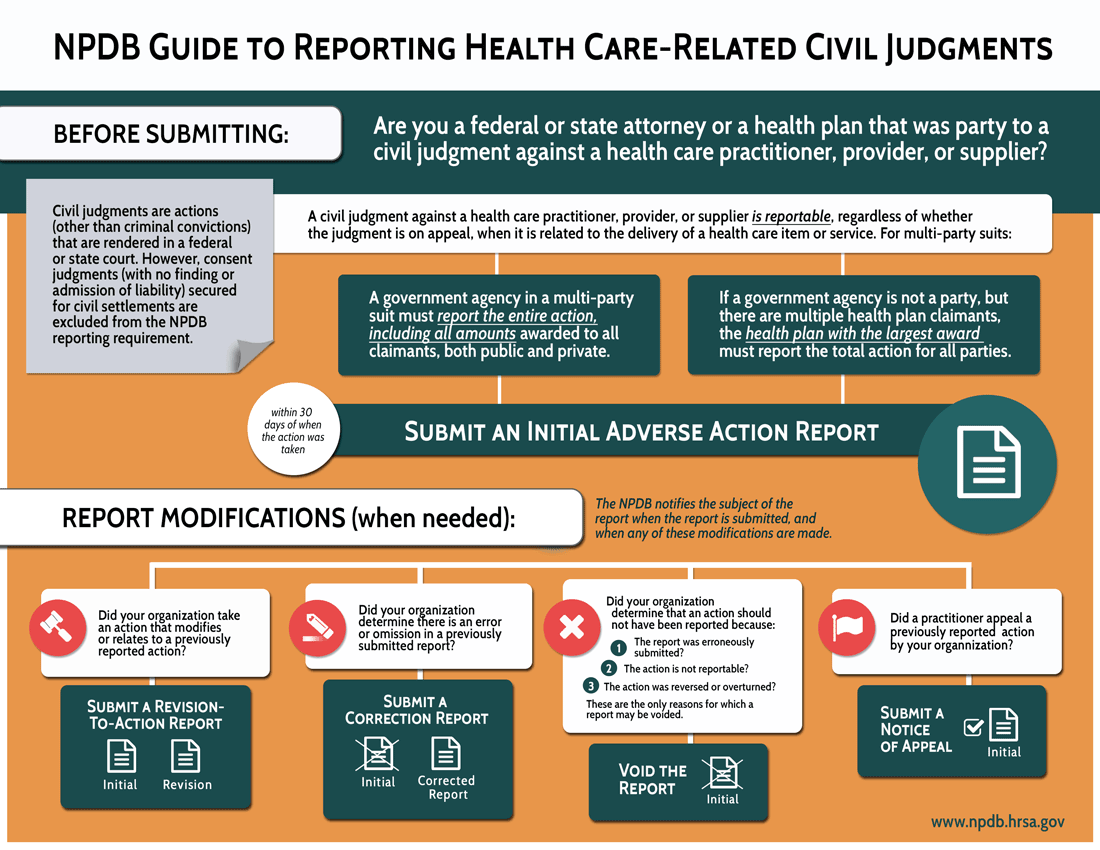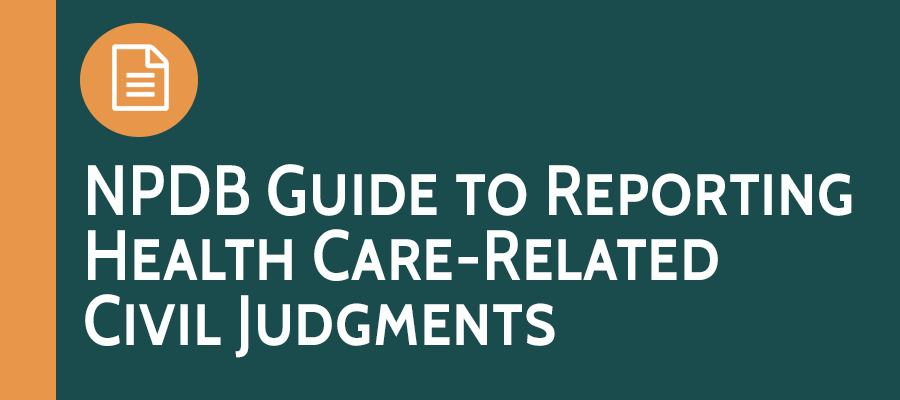Reporting Health Care-Related Civil Judgments
Federal and state attorneys and health plans must report civil judgments related to the delivery of a health care item or service against health care practitioners, providers, or suppliers, regardless of whether the civil judgment is the subject of a pending appeal. NPDB regulations define civil judgment as "a court-ordered action rendered in a federal or state court proceeding, other than a criminal proceeding. This reporting requirement does not include consent judgments that have been agreed upon and entered to provide security for civil settlements in which there was no finding or admission of liability." Settlements in which no findings of liability have been made are statutorily excluded from being reported. However, actions that occur in conjunction with settlements in which no findings of liability have been made and that otherwise meet NPDB reporting requirements must be reported.
Additionally, actions made with respect to medical malpractice claims should not be reported as civil judgments, but any payment made for the benefit of a health care practitioner in settlement of a medical malpractice claim or judgment must be reported to the NPDB by the medical malpractice payer.
If a government agency is party to a multi-claimant civil judgment (that is, more than one party has been awarded an amount because of the civil judgment), it must assume the responsibility for reporting the entire action, including all amounts awarded to all the claimants, both public and private. When a government agency is not a party, but there are multiple health plans as claimants, the health plan that receives the largest award is responsible for reporting the total action for all parties. If more than one health plan receives the largest award, the plans receiving the largest award must work out among themselves which health plan will report to the NPDB for all parties, making sure that one - but only one - report is filed.
In addition to reporting initial health care-related civil judgments, federal and state attorneys and all health plans also must report any revisions to previously reported actions, including that an action is on appeal. For more information, go to Types of Reports in this chapter.
Table E-23 outlines reporting obligations for health care-related civil judgments.
| Law | Who Reports? | What is Reported? | Who is Reported? |
|---|---|---|---|
| Section 1921 | State attorneys | Health care-related civil judgments in state court | Practitioners, providers, and suppliers |
| Section 1128E | Federal attorneys Health plans |
Health care-related civil judgments in federal or state court | Practitioners, providers, and suppliers |
Table E-24 provides guidance on when health care-related civil judgments must be reported to the NPDB.
| |
|
|---|---|
| A judgment is entered against a clinical laboratory, resulting in a $10,000 award for fraudulent billing and misleading marketing in a suit brought by health insurers and health care payers. | Yes |
| A judgment imposes a $40,000 fine on a medical supplies company for hiring discrimination. | No |
| A judgment against a nursing home imposes a $50,000 fine for neglect and for failure to adequately clean patients' rooms. | Yes |
| A judgment against an ambulance company results in a $30,000 fine for filing false claims and receiving payments for ambulance transportation in cases that were not medically necessary and for patients whose ambulatory status did not require such transportation. | Yes |
| A judgment is entered against a practitioner stemming from an automobile accident not related to the delivery of a health care item or service. | No |
Sanctions for Failing to Report to the NPDB
If HHS determines that a federal or state attorney has substantially failed to report information required to be reported to the NPDB, the name of the government agency will be published and made publicly available.
Any health plan that fails to report to the NPDB information on an adverse action that is required to be reported will be subject to a civil monetary penalty for each adverse action not reported. The penalty will be imposed and collected in the same manner as other civil monetary penalties pursuant to Section 1128A of the Social Security Act, 42 USC § 1320a-7a. Regulations governing civil money penalties under Section 1128A are set forth at 42 CFR Part 1003.

Update October 2018
The following table describes changes made to the NPDB Guidebook. Style and formatting changes made throughout the Guidebook that do not affect the substance of the text are not indicated below. References to new figures added to this edition can be found in the Table of Figures.
- Modified the section entitled "Sanctions for Failing to Report to the NPDB."
Sections Updated
 An official website of the United States government.
An official website of the United States government.


